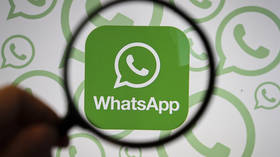France bans government employees from WhatsApp

French government employees have been officially forbidden from using WhatsApp, Telegram, Signal and other widely-used messaging apps for internal communications due to security vulnerabilities, a memo from Prime Minister Elisabeth Borne, obtained by French broadcaster BFMTV on Wednesday, revealed. The ban takes effect December 8.
Cabinet members are instead encouraged to use French encrypted messaging app Olvid, which, unlike its global competitors, does not require a SIM card or phone number from its users and encrypts metadata as well as message content. The French app, said to be more private and secure than those competitors, is the only messaging platform to be awarded a security certificate by the French National Agency for the Security of Information Systems (ANSSI). Another French messaging app, Tchap, is also permitted.
The rule is similar to a policy adopted by the military of Switzerland, which ordered soldiers to stop using the three popular messaging apps last year and instead to use Threema, a domestically-developed encrypted messaging service, for both official and private chats.
Borne’s memo represents the second round of app bans for French public servants this year. In March, Minister of Public Services Stanislas Guerini announced that TikTok and similar “recreational apps” were to be prohibited on government phones due to the security risks they posed. Twitter and Instagram were also banned, as were streaming video platform Netflix, the game Candy Crush, and dating apps.
At the same time, the National Assembly urged MPs to “limit” their use of TikTok, which has been banned from government phones in nearly a dozen countries and the EU due to concerns about data security. Legislators were also encouraged to cut back on their use of Instagram, Snapchat, WhatsApp, Telegram, and Signal.
While WhatsApp offers theoretically encrypted messaging, the company, a subsidiary of Facebook’s parent company Meta, is known for readily handing over users’ data to the US government without even the suspicion that the user has committed a crime. A security flaw in the app also allowed Israeli spyware tool Pegasus to be installed on the user’s phone without requiring any action from that user, who otherwise had to click a link to unwittingly turn their phone into a surveillance device. French President Emmanuel Macron personally changed his phone and his number in 2021 after it was reported that he and 14 of his cabinet ministers had been targeted for surveillance by Morocco using Pegasus.
In July, the French government adopted a law permitting law enforcement agencies to remotely access the cameras, microphones, and location services of devices belonging to individuals suspected of involvement in illegal activities for which the punishment is more than five years in prison, such as terrorism.













